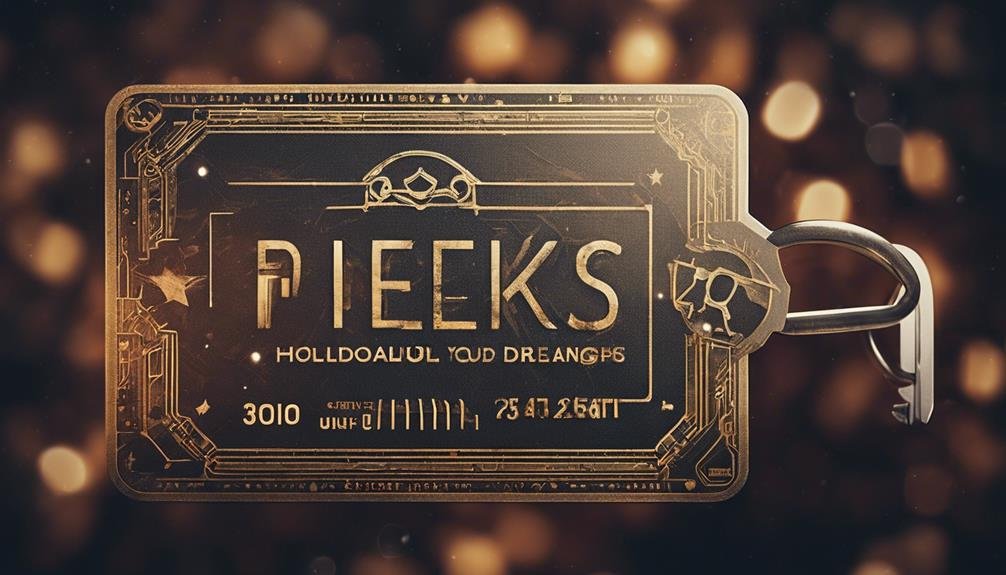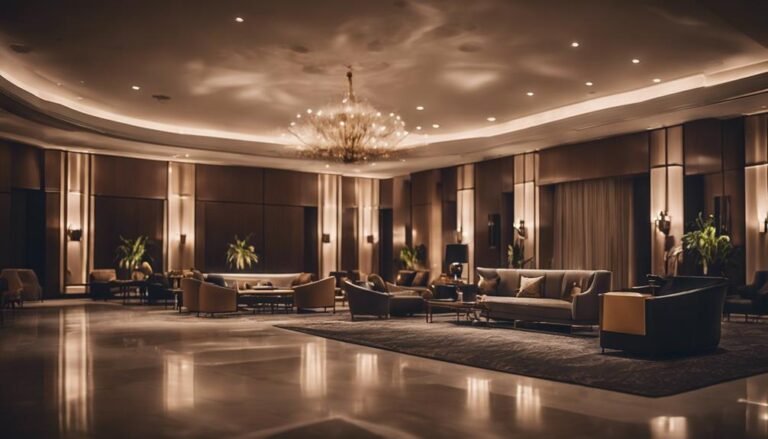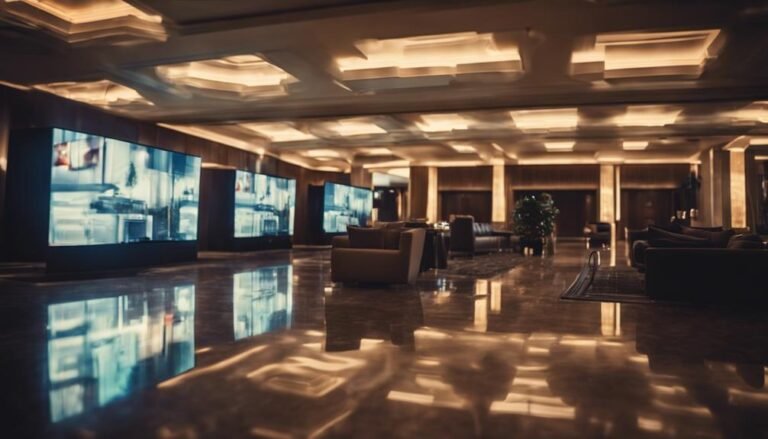Designing Loyalty Programs That Keep Hotel Guests Coming Back
When Marriott Bonvoy revamped its loyalty program to offer more personalized experiences and benefits tailored to individual guest preferences, it saw a significant increase in member retention and engagement.
Imagine being able to create a loyalty program for your hotel that not only keeps guests coming back but also makes them feel truly valued and appreciated throughout their stay.
Implementing strategies that go beyond just points accumulation can truly set your hotel apart in a competitive market.
Key Takeaways
- Offer exclusive rewards tailored to guest preferences
- Analyze feedback to enhance guest experience
- Create personalized experiences for increased engagement
- Utilize data analytics for program effectiveness
Benefits of Loyalty Programs
Loyalty programs in the hotel industry offer guests exclusive rewards and privileges for their continued patronage, fostering a sense of value and appreciation. Customer retention is a key focus of these programs, aiming to create a loyal customer base that repeatedly chooses the same hotel for their accommodation needs. By providing incentives such as room upgrades, free nights, or access to exclusive amenities, hotels can enhance the overall guest experience, thus increasing the likelihood of guests returning in the future.
Value creation is another critical aspect of loyalty programs. These programs not only benefit guests by offering rewards but also add value to the hotel's offerings. Guests feel a sense of appreciation and special treatment, leading to a positive perception of the hotel brand. This perceived value can set the hotel apart from competitors and encourage guests to prioritize staying at the same hotel chain due to the added perks and benefits they receive. Ultimately, loyalty programs are a strategic tool for hotels to increase customer retention and create lasting value for both guests and the hotel itself.
Understanding Guest Preferences
When designing hotel loyalty programs, it's crucial to analyze guest preferences thoroughly. Understanding what your guests value can lead to a more personalized experience, enhancing their overall satisfaction with your program.
Tailoring reward options based on these preferences can significantly increase guest engagement and loyalty.
Guest Preferences Analysis
How do guest preferences play a crucial role in shaping effective hotel loyalty programs?
Guest preferences, gathered through feedback and satisfaction surveys, provide valuable insights into what guests value most during their stay. Understanding these preferences allows hotels to tailor their loyalty programs to offer rewards and incentives that resonate with their guests.
By analyzing feedback and satisfaction scores, hotels can identify trends and patterns that help in creating personalized experiences and enhancing overall guest satisfaction. This analysis enables hotels to make data-driven decisions that lead to the development of loyalty programs focused on meeting guests' specific needs and expectations.
Ultimately, aligning loyalty program offerings with guest preferences results in increased guest engagement and retention.
Personalized Experience Approach
Crafting a personalized experience for guests starts with delving into their individual preferences and desires. Guest profiling is essential in understanding what each guest values, whether it's room location, amenities, or dining options. By collecting data and creating detailed guest profiles, hotels can offer customized recommendations and individualized services.
Loyalty segmentation allows hotels to group guests based on their preferences, enabling targeted approaches to enhance their stay experience. Tailoring services to meet specific needs fosters a sense of belonging and strengthens guest loyalty. By personalizing each guest's experience through a deep understanding of their preferences, hotels can build long-lasting relationships that keep guests coming back.
Tailored Reward Options
To enhance guest loyalty and satisfaction, it's crucial for hotels to offer tailored reward options that align closely with individual guest preferences. Customized benefits play a significant role in creating a personalized experience for guests, fostering a sense of value and appreciation.
By understanding guest preferences through data analysis and feedback, hotels can tailor rewards such as room upgrades, complimentary services, or exclusive experiences to cater to specific desires. Targeted promotions that reflect guests' past behaviors and preferences can also enhance the effectiveness of loyalty programs, increasing engagement and retention rates.
Providing personalized rewards not only strengthens the emotional connection between guests and the hotel but also encourages repeat visits and positive word-of-mouth recommendations, ultimately leading to long-term guest loyalty.
Personalized Rewards and Incentives
When designing hotel loyalty programs, incorporating personalized rewards and incentives can significantly enhance customer engagement and loyalty. By offering customized incentives and personalized rewards, hotels can create a more tailored experience for their guests, ultimately leading to increased satisfaction and repeat visits.
Here are three key reasons why personalized rewards and incentives are crucial in hotel loyalty programs:
- Increased Customer Satisfaction: Personalized rewards make guests feel valued and appreciated, leading to a higher level of satisfaction with their overall stay experience.
- Enhanced Loyalty: When guests receive rewards that are tailored to their preferences and behaviors, they're more likely to develop a sense of loyalty towards the hotel brand.
- Improved Engagement: Customized incentives can drive increased engagement with the loyalty program, encouraging guests to actively participate and reap the benefits offered.
Seamless Booking and Redemption Process
For a hotel loyalty program to effectively retain and attract guests, a seamless booking and redemption process is essential. Ensuring a smooth user experience from the moment a guest decides to book a room to redeeming their loyalty points can significantly impact loyalty retention. A streamlined process not only enhances convenience but also reflects the hotel's commitment to valuing its guests' time and preferences.
| Aspect | Importance | Impact on User Experience |
|---|---|---|
| Online Booking | High | Simplifies reservation process, increasing user satisfaction |
| Redemption Options | Medium | Diverse options enhance user experience and engagement |
| Mobile Accessibility | High | Easy access on-the-go improves user convenience and loyalty |
Communication and Engagement Strategies
Ensuring effective communication and engagement strategies is crucial for maximizing guest participation and loyalty in a hotel loyalty program. To achieve this, consider the following strategies:
- Interactive Surveys: Implementing interactive surveys allows hotels to gather valuable feedback directly from guests. By understanding guest preferences, concerns, and suggestions, hotels can tailor their loyalty program offerings to better meet customer needs, ultimately enhancing guest satisfaction and loyalty.
- Social Media Engagement: Utilizing social media platforms enables hotels to engage with guests in real-time, share updates about the loyalty program, and create a sense of community among members. By actively participating in social media conversations, hotels can strengthen relationships with guests and keep them informed about exclusive offers and rewards.
- Personalized Communication: Tailoring communication to individual guests based on their preferences and past interactions with the loyalty program can significantly increase engagement. Personalized messages, such as special offers or personalized recommendations, demonstrate to guests that their loyalty is valued, fostering a stronger connection with the hotel brand.
Exclusive Member Events and Offers
To enhance member engagement and foster loyalty, consider organizing exclusive events and offering tailored benefits within your hotel loyalty program. Member benefits play a crucial role in creating a sense of belonging and appreciation among your loyal guests. By providing exclusive perks such as room upgrades, complimentary services, or personalized experiences, you can make members feel valued and special. These benefits not only incentivize repeat stays but also encourage members to choose your hotel over competitors.
In addition to tangible benefits, hosting loyalty events can further strengthen the bond with your members. Organizing special gatherings, such as cocktail parties, spa days, or guided tours, allows members to interact with hotel staff and fellow guests in a relaxed setting. These events create memorable experiences that go beyond traditional stays, fostering a deeper connection to your brand. By incorporating such exclusive member events and offers into your loyalty program, you can differentiate your hotel, increase member satisfaction, and ultimately drive repeat business.
Data Analytics for Program Optimization
Consider leveraging data analytics to optimize your hotel loyalty program, enhancing member engagement and maximizing the effectiveness of your offerings. By utilizing predictive modeling and customer segmentation, you can tailor your loyalty program to meet the specific needs and preferences of your guests effectively. Here are three key ways data analytics can help you optimize your program:
- Predictive Modeling: By using historical data and trends, predictive modeling can help you anticipate future guest behavior, allowing you to proactively offer personalized rewards and incentives that resonate with each member.
- Customer Segmentation: Segmenting your guests based on preferences, demographics, and behavior patterns enables you to create targeted marketing campaigns and loyalty rewards that are more likely to drive engagement and repeat visits.
- Performance Evaluation: Analyzing the performance of your loyalty program through data analytics can provide valuable insights into what's working well and what areas need improvement, helping you make data-driven decisions to enhance overall program effectiveness.
Harnessing the power of data analytics can give your hotel loyalty program a competitive edge and foster long-term guest loyalty.
Incorporating Feedback for Improvement
Incorporating guest feedback into your hotel loyalty program is instrumental for continuous improvement and enhancing overall guest satisfaction. Feedback implementation allows you to gain valuable insights into areas where your program excels and where it may fall short.
By actively listening to your guests' comments and suggestions, you can identify opportunities for enhancement and make informed decisions to address any shortcomings. Analyzing feedback trends can help you spot recurring issues and prioritize improvements that will have the most significant impact on guest experience.
Continuous improvement is a cyclical process that should be ingrained in your loyalty program strategy. Regularly soliciting, analyzing, and acting upon feedback demonstrates your commitment to providing exceptional service and value to your guests. Remember that feedback is a powerful tool that can guide your program's evolution and foster stronger relationships with your guests.
Embracing a culture of feedback-driven improvement will set your hotel loyalty program on the path to long-term success.
Partnerships and Collaborations
When designing hotel loyalty programs, it's crucial to consider strategic alliances for growth, joint promotional activities, and shared rewards programs.
By forming partnerships with other businesses or brands, you can expand your reach and offer unique benefits to your loyal customers.
Collaborating on promotions and rewards can create added value and enhance the overall customer experience, fostering stronger connections and increasing customer retention.
Strategic Alliances for Growth
To foster growth and enhance competitive advantage, forming strategic alliances through partnerships and collaborations is key for hotel loyalty programs. Strategic partnerships provide various growth opportunities for hotel loyalty programs:
- Expanded Reach: Collaborating with airlines, car rental companies, or other hospitality businesses can help hotels tap into new markets and reach a broader audience.
- Enhanced Value Proposition: Partnering with premium brands or local attractions can add value to the loyalty program, making it more attractive to guests.
- Shared Resources: By forming alliances, hotels can benefit from shared resources, expertise, and customer base, leading to mutual growth and success.
Joint Promotional Activities
Fostering growth and enhancing competitive advantage in hotel loyalty programs involves strategically engaging in joint promotional activities through partnerships and collaborations. By forming collaborative campaigns and exploring partnership opportunities, hotels can expand their reach and attract new guests. These joint promotional activities not only help in sharing marketing costs but also in leveraging each partner's strengths to create compelling offers for customers. To illustrate the effectiveness of such strategies, consider the following table showcasing successful joint promotional activities in the hospitality industry:
| Partner 1 | Partner 2 | Campaign Theme |
|---|---|---|
| Airline | Hotel Chain | Travel Rewards |
| Local Attractions | Hotel | Stay & Explore Package |
| Spa | Wellness Brand | Relaxation Retreat |
| Food Delivery | Hotel | In-Room Dining Deals |
| Car Rental | Hotel | Stay & Drive Packages |
Shared Rewards Programs
Engaging in shared rewards programs through strategic partnerships and collaborations can significantly enhance the value proposition of hotel loyalty programs. By forming loyalty partnerships, hotels can offer customers a broader range of rewards and benefits, ultimately increasing customer retention.
Collaborating with other businesses allows hotels to tap into new customer bases and offer unique experiences, creating a competitive edge in the market. Additionally, shared rewards programs enable hotels to leverage the strengths of their partners, enhancing the overall value provided to guests.
Through these partnerships, hotels can create a more holistic loyalty program that caters to diverse customer preferences, driving higher engagement and loyalty. By embracing collaborations, hotels can amplify the success of their loyalty programs and foster long-term customer relationships.
Conclusion
To sum it up, when designing loyalty programs for hotel guests, remember that personalized rewards and seamless booking processes are pivotal.
By incorporating data analytics and guest feedback, you can optimize the program for maximum engagement.
Partnering with other businesses and offering exclusive events will also attract and retain loyal customers.
Keep these key elements in mind to create a captivating and compelling loyalty program that keeps guests coming back for more.







